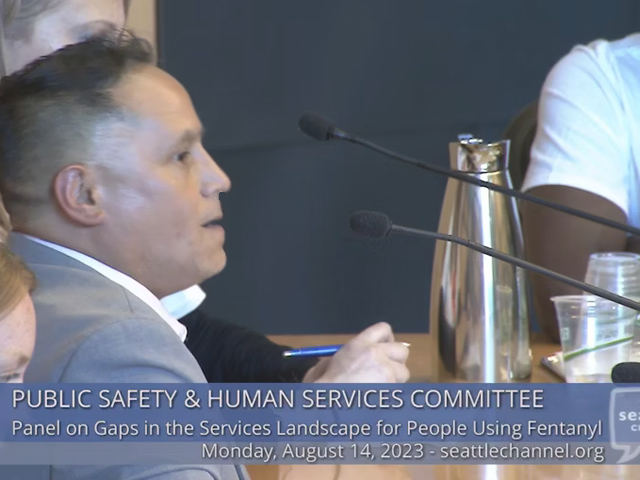News
KUOW: Seattle City Council discusses new iteration of proposed drug possession law
Posted on

This story was originally published by KUOW on Aug. 15, 2023
As the Seattle City Council discussed the second version of a proposed drug possession law Monday, frontline workers asked for more funding to help people with addiction, downtown property managers spoke in support of the ordinance, and mayoral staff said they hope to fund overdose stabilization center.
The council expects to vote on the new drug possession ordinance in September. It would put the City Attorney’s Office in charge of prosecuting drug possession and public drug use, which are classified as gross misdemeanors under the state’s new drug law.
The council voted down a previous version of the measure in June. The latest version, proposed by Mayor Bruce Harrell and crafted by a Fentanyl Systems Work Group he appointed, instructs police to make arrests only if the person possessing or publicly using illicit drugs poses a risk of harm to others. It also contains some additional funding to help people who overdose.
On Monday, the mayor’s special projects director Andrew Myerberg told city council members that they already have a priority in mind for the proposal’s $7 million in capital funding.
“There are certain types of programs that we want to fund with that capital money,” Myerberg said. “So for example, a post-overdose stabilization center, so somewhere for people to go after they’ve overdosed to be stabilized and put on medication.”
The proposal also contains $20 million from opioid settlement funds, but that is spread over 18 years, for an average of $1.15 million per year. Myerberg said those funds could be used to operate the new overdose facilities, and to fund the overdose response by the Seattle Fire Department’s Health One unit, among other uses.
Council members said they are seeking more information on how the Seattle Police Department will train officers to enforce the new law, and how officers will evaluate whether a person poses harm to others.
Council members also said they want to know how the mayor’s next budget will fund existing programs, such as LEAD, that divert people with substance use disorder from jail.
Councilmember Lisa Herbold chairs the Public Safety Committee, which convened a panel of frontline service providers Monday that included Johnny Bousquet. He is a program supervisor and a previous participant in the LEAD diversion program, which provides case management, legal assistance, and help obtaining medically assisted drug treatment and permanent housing.
“I’ve witnessed the havoc that the fentanyl and meth epidemic has wreaked on our community on a daily basis, and am myself in recovery from opiates, meth, and cocaine as of the last 5.5 years,” Bousquet said. He said he was arrested in 2014 for selling a small amount of crack and accepted into the LEAD program. “Instead of going to jail, I was given the opportunity to get my life back on track,” Bousquet said. Now he oversees that outreach to others.
“We need to be able to expand greatly in order to address this public health crisis on a scale that is our reality,” he said.
Malika Lamont with VOCAL-WA said in order to maintain current levels of service for those programs, the city must replace $8 million in one-time funds that expire after this year.
Several members of the Downtown Seattle Association and Seattle Metropolitan Chamber of Commerce also attended Monday’s meeting, to speak in support of the proposed drug ordinance and more funding for diversion and treatment.
Shawn Jackson is managing director at the Urban Renaissance Group, which manages or owns over seven million square feet of office space in Seattle. He says public drug use is one barrier to attracting tenants.
“We have a building at Fourth and Pike that we can’t even get a look from anybody leasing space, because they talk about the neighborhood. This is our reality,” he said. “We support this bill, it’s a critical step in addressing these issues, and we hope you will consider providing additional services for these needs.”
The city council is expected to formally consider and vote on the proposed drug ordinance in September. Unless council members accelerate the process, it would likely mean the council’s Public Safety Committee would review the legislation on Sept. 12, with a full council vote on Sept. 19.